STATE GOVERNMENT
2015 Legislature: Let’s rise to the challenge!
Legislature has opportunity to rebuild our state, middle class
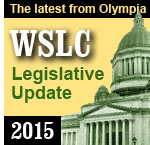
 Today’s edition of the WSLC Legislative Update newsletter:
Today’s edition of the WSLC Legislative Update newsletter:
OLYMPIA (Jan. 12, 2015) — The Washington State Legislature’s 2015 session opens today and most agree that deliberations over the 2015-17 biennial budget will occupy center stage for the next 105 days.
More than a decade of budget cuts, unrestrained tax-break giveaways, and an antiquated and regressive revenue system have strangled our schools, colleges, roads, bridges, prisons, hospitals, ferries, and many other public services into disrepair. It’s gotten so bad that the state government is at the brink of a constitutional crisis. The legislative and judicial branches are in a staredown over how — and whether — legislators can be compelled by the courts to properly fund public schools, the mental health system, and other government functions.
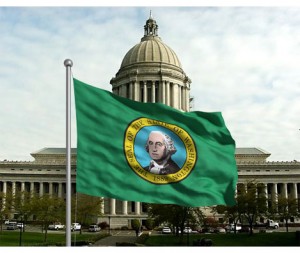 Meanwhile, the dedicated public employees who teach and protect our children, build and maintain our infrastructure, keep our families safe, and provide the other critical services most take for granted have had to do much more with much less. State government employment is down, but workloads are up significantly as population and needs continue to grow. The state employees we have asked to meet these extraordinary demands haven’t had a cost-of-living pay increase in six years, the longest stretch of frozen wages eroded by inflation that anyone can remember.
Meanwhile, the dedicated public employees who teach and protect our children, build and maintain our infrastructure, keep our families safe, and provide the other critical services most take for granted have had to do much more with much less. State government employment is down, but workloads are up significantly as population and needs continue to grow. The state employees we have asked to meet these extraordinary demands haven’t had a cost-of-living pay increase in six years, the longest stretch of frozen wages eroded by inflation that anyone can remember.
At the same time, the state and nation is awakening to the fact that income inequality between the rich and the poor has grown so extreme that it threatens both our economic and social stability. Job growth has returned, but wage growth has not, and the power of the working class to collectively demand better treatment has been systematically weakened. Frustrated by state and federal government inaction, citizens are demanding — and winning! — local ordinances that raise the minimum wage, grant all workers the ability to earn paid sick leave, and insist on other fundamental job protections.
The Washington State Labor Council, its affiliated unions, and community partners will pursue a Shared Prosperity Agenda in the 2015 Legislature that harnesses this popular and growing support for pro-worker change. It will focus on rebuilding the middle class by lifting low-wage workers out of poverty, by investing in quality public services and infrastructure to keep Washington competitive and create better jobs, and by establishing tax incentive and revenue accountability so we can afford to do so without making the nation’s most regressive tax system even worse.
Our Shared Prosperity Agenda will be unveiled in more detail at a press conference later this week. Stay tuned (and subscribe) to The Stand, the WSLC’s award-winning news service, at www.thestand.org for daily updates.
What’s changed in 2015…
The WSLC’s Shared Prosperity Agenda will be considered by a 2015 State Legislature with a political makeup similar to 2013-14. Democrats still control the governor’s office and the House, though with a slightly smaller 51-47 majority. Republicans still control the Senate, though now with an actual majority and have effectively dispensed with the “Majority Coalition Caucus” pretense created by the 2013-14 defections of two conservative Democrats. There are now 25 Republicans and 23 Democrats. (Apparently, Sen. Tim “Call Me Maverick” Sheldon will continue calling himself an MCC member, making that a caucus of one.)
As always, the session begins on hopeful rhetorical notes of bipartisanship and working together to meet the aforementioned significant challenges. It is certainly true that ours needn’t be a “divided government” unless legislators choose to make it so.
But there are already disturbing signs that the new narrow Senate Republican majority may be taking a hard right turn…
Senate Republicans tap anti-union Baumgartner to chair labor panel
Republicans decided to make Sen. Michael Baumgartner (R-Spokane) the new chair of the Commerce and Labor Committee, replacing former Sen. Janéa Holmquist Newbry (R-Moses Lake), who gave up her Senate seat in an unsuccessful bid for Congress. Baumgartner has never been a member of this committee so it’s not clear why he was elevated past the Republicans who have.
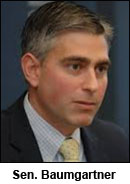 What we do know is that Baumgartner was the only state legislator last session to sponsor a so-called “right-to-work” bill, an aggressively anti-labor measure that would ban union-security agreements between workers and employers in Washington. Those agreements require all who benefit from union contract to pay at least a representation fee. “Right-to-work” laws are designed to promote free riders, or workers who pay nothing but the union must still represent. States that have enacted such laws have dramatically fewer union members and workers there receive significantly lower wages and fewer benefits — the precise opposite of what policymakers should be striving for amidst the worst income inequality since the Gilded Era.
What we do know is that Baumgartner was the only state legislator last session to sponsor a so-called “right-to-work” bill, an aggressively anti-labor measure that would ban union-security agreements between workers and employers in Washington. Those agreements require all who benefit from union contract to pay at least a representation fee. “Right-to-work” laws are designed to promote free riders, or workers who pay nothing but the union must still represent. States that have enacted such laws have dramatically fewer union members and workers there receive significantly lower wages and fewer benefits — the precise opposite of what policymakers should be striving for amidst the worst income inequality since the Gilded Era.
Other labor-related legislation of note that Baumgartner has sponsored includes a proposal requiring all workers in Washington who have been laid off through no fault of their own and who are actively looking for work to also perform community service in order to receive their unemployment insurance benefits. Like his “right-to-work” bill, that legislation had no Senate co-sponsors.
Choosing Baumgartner to run the committee through which almost all labor-related legislation must pass sends a pretty clear signal. It’s a dramatic shift from last year’s Majority Coalition Caucus posturing about bipartisanship and reaching across the aisle. That said, labor leaders have expressed a willingness to work with Baumgartner and give him the opportunity to be open-minded and fair about the committee process.
“The appointment of Senator Baumgartner, an outspoken opponent of collective bargaining rights and unions, to chair the labor committee was a surprise. It begins the session by piercing the Senate’s veil of bipartisanship,” said Jeff Johnson, President of the Washington State Labor Council. “How he actually chairs the committee and wants to interact with labor, only time will tell.”
Baumgartner’s first act as chair was to organize a work session this week highlighting the “reduction in trade volume at Washington’s ports” and discuss “the state’s role” in addressing it. The hearing will begin Wednesday, Jan. 14 at 8 a.m. in Senate Hearing Room 4. At press time, we’re told that neither the shippers’ Pacific Maritime Association nor the International Longshore and Warehouse Union are likely to testify about the status of negotiations for a contract covering all West Coast dock workers because, having just entered federal mediation, those talks are at a very delicate stage.
It’s fair to wonder whether Baumgartner’s first foray into labor issues might do more harm than good.
Same-old transportation roadblocks?
In addition to the operating budget, the other priority fiscal package in 2015 will be transportation funding. In recent years, business leaders, environmentalists, transit advocates, and the labor movement have all worked together to urge lawmakers to approve a transportation revenue package. But to no avail.
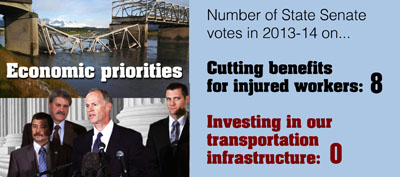 In 2013, the House approved such a package, but the Senate failed to act on it or propose an alternative. In 2014, the Senate again failed to hold a vote on transportation funding. Instead, Senate Republican leaders have spent the past two years talking about the need for “reforms before revenue.” Their list of “reforms” have included some poison pills like cutting the prevailing wages earned by construction workers who build and maintain our roads, highways and bridges.
In 2013, the House approved such a package, but the Senate failed to act on it or propose an alternative. In 2014, the Senate again failed to hold a vote on transportation funding. Instead, Senate Republican leaders have spent the past two years talking about the need for “reforms before revenue.” Their list of “reforms” have included some poison pills like cutting the prevailing wages earned by construction workers who build and maintain our roads, highways and bridges.
It wasn’t just unions that called out these ideological policies as transportation package hostages that could never pass on their own merits. The (Everett) Herald editorialized: “No package can be held hostage to a partisan wish list and deal killers such as ‘an open dialogue on prevailing wage.’ Most assume these throwaways were inserted to assuage red-meat caucus members. But keep-em-happy politics can’t be allowed to sidetrack the package goal.”
At the Associated Press legislative preview briefing last Thursday, Senate Majority Leader Mark Schoesler (R-Ritzville) again called for “real reforms and not just window dressing” before his party would discuss how to pay for transportation improvements. When a reporter followed up by asking which “reforms” he had to have, Schoesler’s short list included lowering prevailing wages.
The Washington Roundtable, representing executives from the biggest private employers in the state, released a study last fall that found the payback from state transportation investments will be sixfold: $42 billion in economic benefits from $7 billion invested. That’s the kind of payback legislators should be talking about, not political payback or pay cuts for working families, which would limit the economic returns on this investment.
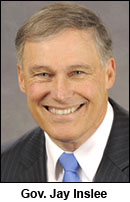 Gov. Jay Inslee has proposed a bold, innovative 12-year, $12-billion transportation package financed by various fees and a new carbon pollution charge. It is an excellent starting point for a serious conversation about how to make this investment.
Gov. Jay Inslee has proposed a bold, innovative 12-year, $12-billion transportation package financed by various fees and a new carbon pollution charge. It is an excellent starting point for a serious conversation about how to make this investment.
For generations, previous legislatures under Democratic, Republican, and shared control have found a common interest in maintaining and improving our transportation infrastructure. It’s good for business. It’s good for workers. It’s good for everyone who uses the system. And it’s a smart investment for taxpayers, with economic benefits that far outweigh the costs. It will be beyond frustrating if another session passes with a “partisan wish list and deal killers” like prevailing wage cuts again taking precedence over the common good of Washington state.





